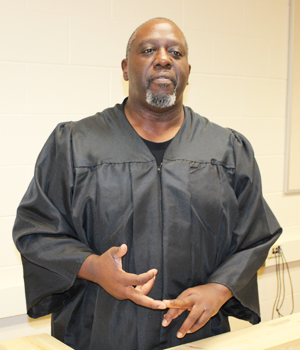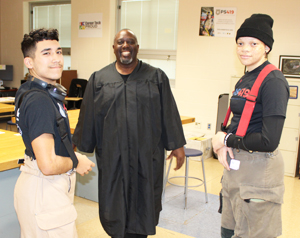 By Rev. Donald L. Perryman, Ph.D.
By Rev. Donald L. Perryman, Ph.D.
The Truth Contributor
In order to be it, you must see it. – Lupita Nyong’o
No one understands the power of representation and visibility in shaping one’s goals and ambitions quite like Andre Tiggs, a figure whose life journey embodies the transformative impact of mentorship and the importance of diverse pathways in career development.
From his early days at Mount Vernon Elementary School through his time at McTigue Jr. High and Rogers High School, Tiggs’ trajectory was anything but linear. His initial venture into higher education at Bowling Green State University was cut short by infrequent youthful indiscretions. This detour saw him returning to Toledo and eventually finding his footing at the University of Toledo while simultaneously working a third shift at the post office.
Tiggs’ career path took a decisive turn when he followed in his father’s footsteps, joining him on the Toledo Fire Department in 1989. His journey with the department was marked by a continuous quest for education and self-improvement, leading Tiggs to become a certified fire investigator and eventually earn degrees in fire science and criminal justice alongside his father. His experience highlights the impact of visible role models on career choices for African Americans and other minorities.
There are many reasons for the impediments to the recruitment and career development of minorities in public safety. However, the likelihood of minorities pursuing these careers increases when they see themselves reflected in their mentors and others that they can personally identify with.
Tiggs’ career, encompassing roles such as firefighter, dispatcher, fire investigator and police officer, underscores the value of education and mentorship in overcoming barriers in law enforcement and other public safety fields.
In this conversation with Andre Tiggs, we explore how his life and career contribute to reshaping the landscape of minority recruitment and empowerment in public safety.
 Perryman: Can you share your experience in Public Safety?
Perryman: Can you share your experience in Public Safety?
Tiggs: I joined the fire department on September 22, 1989. Over my career, I served as a firefighter, spent four years as a dispatcher, and the last 26 years as a fire investigator.
Perryman: Can you describe your role as an investigator?
Tiggs: As a fire investigator, my main tasks were to identify the origin and cause of fires, determining whether they were accidental, natural or intentional. If a fire was suspected to be deliberate, I investigated potential motives, whether for insurance fraud, revenge, or other reasons. In cases involving specialized areas like electrical, I’d collaborate with experts from the electrical department. If there was a fatality, the Toledo Police Department (TPD) would also get involved. In such cases, I focused on the fire’s origin and cause, while TPD detectives handled the homicide investigation. This collaboration was crucial in cases where the fire was a result of criminal activity.
Perryman: Did you lead the arson unit?
Tiggs: Until 2008, my dad Thomas Tiggs led the unit as a battalion chief. After his retirement, I worked under Luis Santiago, the deputy chief who later became fire chief. My role allowed me to work independently, canvassing neighborhoods and engaging with the community, which I found fulfilling, especially in making a difference in people’s lives.
Perryman: How did you make a difference as a member of the public safety team?
Tiggs: I often dealt with cases where good people made bad decisions. In cases leading to the prosecutor, I could recommend alternatives to arson charges, like probation, especially if no insurance claim was made. I focused on positively impacting youth through mentoring, speaking at schools and after-school programs and coaching junior bowling leagues.
Perryman: Can you tell me about the origins of the PS 419 Career Tech program?
 Tiggs: PS 419, a public safety program, began in August 2021 at Toledo Public Schools. I was selected to lead it due to my unique background in fire and police academies. The program is based at Bowsher High School and is designed to introduce students to various public safety jobs. It is available to all Toledo Public School students. It’s a two-year course from sophomore year, where students explore different trades. The program covers corrections, policing, and firefighting in detail, including field trips and guest speakers from relevant departments. We address the mental impacts of such careers, emphasizing the need for mental resilience in the face of challenging situations. I got involved to make a difference and guide students in choosing their paths, whether in public safety or other vocational areas.
Tiggs: PS 419, a public safety program, began in August 2021 at Toledo Public Schools. I was selected to lead it due to my unique background in fire and police academies. The program is based at Bowsher High School and is designed to introduce students to various public safety jobs. It is available to all Toledo Public School students. It’s a two-year course from sophomore year, where students explore different trades. The program covers corrections, policing, and firefighting in detail, including field trips and guest speakers from relevant departments. We address the mental impacts of such careers, emphasizing the need for mental resilience in the face of challenging situations. I got involved to make a difference and guide students in choosing their paths, whether in public safety or other vocational areas.
Perryman: What are the key elements of your program?
Tiggs: The program starts with sophomores learning about the correctional system, including juvenile and adult jails and the court system. We organize field trips to jails to provide practical insights. In their junior year, students delve into all aspects of policing, from its history to the use of force and investigation techniques. The senior year is dedicated to firefighting, covering its history, equipment, and operations. Guest speakers from the sheriff, fire and police departments share real-world experiences, discussing the positives and challenges of these careers.
A crucial part of the program is preparing students for the emotional impact of public safety work. I emphasize that they will witness intense, unforgettable scenes, drawing on my experiences and mental health awareness, mainly from my involvement with NAMI. This program is about showing students the realities of public safety helping them decide if it’s the right path for them.
Perryman: How do career tech programs benefit urban and minority youth, and why is public safety education important?
Tiggs: Not everyone is suited for college or has the maturity level to go directly to college from high school. Many of these same youth, though, are talented and possess a high level of skills and intellectual assets. For them, the vocational trades offer equally valuable and sometimes higher-paying opportunities. I guide sophomores to areas they’re interested in, whether barbering, nursing or something else.
In my public safety program, students get an all-around introduction to the sheriff, police, fire departments and 911 services. My advisory board, consisting of professionals from these sectors, enriches the program. We also provide college credits through Owens Community College, which are all transferable to other institutions.
Additionally, students earn industry-recognized credentials in public safety, like CPR certification, Hazmat, and national incident management, which are valuable in their future careers. Also, one thing I love promoting is the fact that vocational trade skills are free and I tell my kids it’s free while you’re in high school, so take advantage of it.
Perryman: Do your program graduates sit for and perform well in the exams for public safety careers?
Tiggs: Yes, they’re well-prepared not just for exams but also for law enforcement and firefighting careers. I also recruit for police, fire and sheriff departments. For example, students can join the sheriff’s corrections at the age of 18. One student is already applying to start in the academy. We guide those under 21 towards roles like security at ProMedica Hospital, which has its own police department. Our program also prepares students for firefighting, including the physical agility test. Since starting the program in 2021, several students have passed these tests and been hired in public safety roles. More students are set to take their tests this year, and I’m confident in their success.
Perryman: Finally, why are you so passionate about public safety?
Tiggs: I had the best of both worlds and I truly, truly enjoyed the job but the biggest part of why I enjoy the job is because I love helping people. I’ve always, always been a people person and I learned and inherited that from my dad. Working in public safety lets me make a real difference, especially with students.
Whether in fire or police services, it’s about positively impacting lives. I’m always willing to give a hand and help out and it’s just something that I’ll continue with, no matter what I’m doing. Public safety is a commitment I’ll always hold dear.
Contact Rev. Donald Perryman, PhD, at drdlperryman@enterofhopebaptist.org

